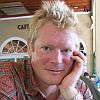In depth with DNA
The Southern California Genealogical Society is one of genealogy’s great success stories — active, motivated, hip. Its annual Jamboree in June is one of the premier genealogical conferences in the west, so much so that the Burbank Fire Department literally stations folks on site to make sure none of the rooms get too crowded.
And at this year’s Jamboree, scheduled for June 7-9, 2013, there’s an added attraction for those who are — or who’d like to be — moving towards using DNA as part of their family history.
It’s “Family History and DNA: Genetic Genealogy in 2013,” a one-day conference designed to fully explore the ins and outs of using genetic genealogy in researching family history. Co-sponsored by the Southern California Genealogical Society (SCGS) and the International Society of Genetic Genealogy (ISOGG), it takes place on June 6th, the day before Jamboree — and it’s going to be terrific.
The headliners of the event are Spencer Wells and Henry Louis Gates Jr., and they alone would make it worth attending. Add in all the other offerings and it’s one of this year’s “Don’t Miss!” events.
 The keynoter is Spencer Wells, Ph.D., Explorer-in-Residence at the National Geographic Society who heads the Society’s Genographic Project. That’s the project that’s collecting and analyzing hundreds of thousands of DNA samples from people around the world in order to decipher how our ancestors populated the planet. You’ve read about the Geno 2.0 phrase of that project here and about my own results here.
The keynoter is Spencer Wells, Ph.D., Explorer-in-Residence at the National Geographic Society who heads the Society’s Genographic Project. That’s the project that’s collecting and analyzing hundreds of thousands of DNA samples from people around the world in order to decipher how our ancestors populated the planet. You’ve read about the Geno 2.0 phrase of that project here and about my own results here.
He’ll open the conference on Thursday morning with “The Genographic Project and the Rise of Citizen Science” — how participation by folks like you and me in projects like Geno 2.0 is advancing what we all know about human origins.
 And just added to the line-up this past week is the lunch speaker, Professor Henry Louis Gates, Jr., of Harvard University — and the brains and moving force behind the PBS series Finding Your Roots and Faces of America (among others).
And just added to the line-up this past week is the lunch speaker, Professor Henry Louis Gates, Jr., of Harvard University — and the brains and moving force behind the PBS series Finding Your Roots and Faces of America (among others).
The author of Life Upon These Shores: Looking at African American History, 1513-2008 (Random House, 2011) and Faces of America (New York University Press, 2010), expanding on the interviews he conducted the documentary series, Dr. Gates is an engaging and entertaining speaker who manages to educate without lecturing. Not an easy task, but one he does well.
The rest of the program is just as strong, covering the gamut from those just thinking about sticking their toes in the DNA waters to those who are advanced genetic genealogists wanting to know how to do more with their results.
Emily Aulicino and I will be working with the beginners: I’ll go over “The ABCs of DNA” and Emily will cover “Genetic Genealogy: Beginner Basics.”
Those wanting to know more about “YDNA” testing will get a good grounding from Alice Fairhurst, and those wanting to know more about “Autosomal DNA Testing for the Genealogist” have CeCe Moore to turn to.
Advanced users can choose from Dr. Tim Janzen’s “Mapping Your Chromosomes with Autosomnal DNA,” Blaine Bettinger’s “Using Third-Party Tools to Analyze Your Autosomal DNA Results,” and Debbie Parker Wayne’s “Mitochondrial DNA: Tools and Techniques to Go Beyond Basics.”
For human drama, it’ll be hard to beat Richard Hill’s deeply personal account of “Finding Family with DNA Testing: An Adoptee Success Story.” And for sheer entertainment, Katherine Hope Borges’s “Famous DNA” is the way to go.
And each of the three major testing companies will be there. Family Tree DNA’s Bennett Greenspan will explain “Genetic Tools: What They are and When to Use Them”; 23andMe’s Joanna Mountain will go over “Getting the Most out of 23andme’s Genealogy Features”; and AncestryDNA’s Ken Chahine will provide “An Inside Look at AncestryDNA.”
It’s going to be a wonderful opportunity to get really immersed in this new and exciting genealogical tool. Come on out and join us!
Registration and other information can be found at the SCGS Family History and DNA website, and note: there’s an extra charge for the lunch.


